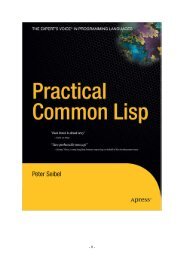Portugal
Portugal
Portugal
Create successful ePaper yourself
Turn your PDF publications into a flip-book with our unique Google optimized e-Paper software.
26<br />
PORTUGAL IN DEPTH<br />
2<br />
PORTUGAL IN POPULAR CULTURE: BOOKS, MUSIC, & FILM<br />
History<br />
A Concise History of <strong>Portugal</strong>, by David<br />
Birmingham is far too short at 209 pages<br />
to capture the full sweep of Portuguese<br />
history, but it is nonetheless a very readable<br />
history for those who like at least a<br />
brief preview of a country’s past before<br />
landing there.<br />
Another version of the same subject is<br />
<strong>Portugal</strong>: A Companion History, by José<br />
H. Saraiva. It will give you a sweeping saga<br />
of the land you’re about to visit.<br />
<strong>Portugal</strong>’s role abroad is best presented<br />
in Charles Ralph Boxer’s Portuguese Seaborne<br />
Empire. Since its initial publication<br />
in 1969, this frequently reprinted book<br />
has been the best volume for explaining<br />
how an unimportant kingdom in western<br />
Europe managed to build an empire<br />
stretching from China to Brazil.<br />
Fiction & Biography<br />
The epic poem of <strong>Portugal</strong>, Os Lusíadas,<br />
written in 1572 by the premier Portuguese<br />
poet Luís Vaz de Camóes, celebrates the<br />
Portuguese Age of Discovery. In 1987,<br />
Penguin rereleased this timeless classic.<br />
The best biography on Camóes himself<br />
remains Aubrey Bell’s Luis de Camóes.<br />
One of <strong>Portugal</strong>’s most beloved writers,<br />
Eça de Queirós, wrote in the late 19th century.<br />
Several of his best-known narratives<br />
have been translated into English, notably<br />
The Maias, The Illustrious House of<br />
Ramires (New Directions Publishing,<br />
1994), The Mandarin and Other Stories,<br />
The City and the Mountains, The Relic,<br />
The Sin of Father Amaro, and Dragon’s<br />
Teeth. Queirós (1845–1900) was the most<br />
realistic Portuguese novelist of his time, and<br />
his works were much admired by Emile<br />
Zola in France. The Maias is the best<br />
known and the best of his works.<br />
The great poet Fernando Pessoa (1888–<br />
1935) is second only to Camóes in the<br />
list of illustrious Portuguese writers. Some<br />
of his works have been translated into<br />
English. Pessoa is still beloved by the<br />
Portuguese, and for decades he appeared<br />
on the 100-escudo note before it went out<br />
of circulation in 2002.<br />
The Return of the Caravels, by<br />
António Lobo Antunes, is an unusual<br />
novel set in 1974. It brings back <strong>Portugal</strong>’s<br />
history as an imperial power by “collective<br />
memory,” as Vasco da Gama, Cabral, and<br />
other explorers return to Lisbon, anchoring<br />
their small but significant vessels<br />
alongside the giant tankers of today.<br />
José Saramago, winner of the Nobel<br />
Prize for Literature (see “General,” above),<br />
remains one of the best novelists of modern-day<br />
<strong>Portugal</strong>. His Baltasar and Blimunda<br />
is a magical account of a flying<br />
machine and the construction of Mafra<br />
Palace—it’s a delightful read.<br />
The work New Portuguese Letters by<br />
the “Three Marias” (Maria Isabel Barreno,<br />
Maria Teresa Horta, and Maria Fátima<br />
Velho da Costa), first published in <strong>Portugal</strong><br />
in 1972, is available in English. The<br />
Portuguese government banned and confiscated<br />
all copies and arrested its authors<br />
on a charge of “outrage to public decency.”<br />
They were acquitted 2 years later, and the<br />
case became a cause célèbre for feminist<br />
organizations around the world.<br />
Wines<br />
The finest book on the most famous of<br />
Portuguese fortified wines, port, is Richard<br />
Mayson’s Port and the Douro. This is<br />
a comprehensive, articulate, and intriguing<br />
work. You learn the history of port<br />
from the 4th century up through modern<br />
methods of bottling the wine today.<br />
MUSIC<br />
Arguably the oldest urban folk music in<br />
the world, fado remains the soul music of<br />
<strong>Portugal</strong>. From the 1940s until her death<br />
in 1999, Amália Rodrigues was the top<br />
diva fadista in <strong>Portugal</strong>. No one in the<br />
post-millennium has dethroned her.<br />
A current sensation, Ana Laíns, takes a<br />
much more contemporary approach to





